Psychological Perspectives in Health and Social Care: Assessment 1
VerifiedAdded on 2023/01/11
|10
|2774
|94
Report
AI Summary
This report examines the application of psychological perspectives in health and social care, focusing on children aged 3-6 years and the challenges of learning disabilities. It delves into two key lifespan psychological theories: Erikson's stages of psychosocial development and Piaget's stages of cognitive development, analyzing their relevance to this life stage. The report explores human cognition, emotions, and behavior patterns specific to this age group, and includes supporting evidence from three recent research studies. The analysis considers the impact of these theories on understanding and addressing learning disabilities in preschool children, providing insights into the cognitive and emotional development of this age group and the implications for health and social care practices. The report highlights the importance of understanding these psychological frameworks in supporting the development and well-being of young children, particularly those facing learning difficulties.
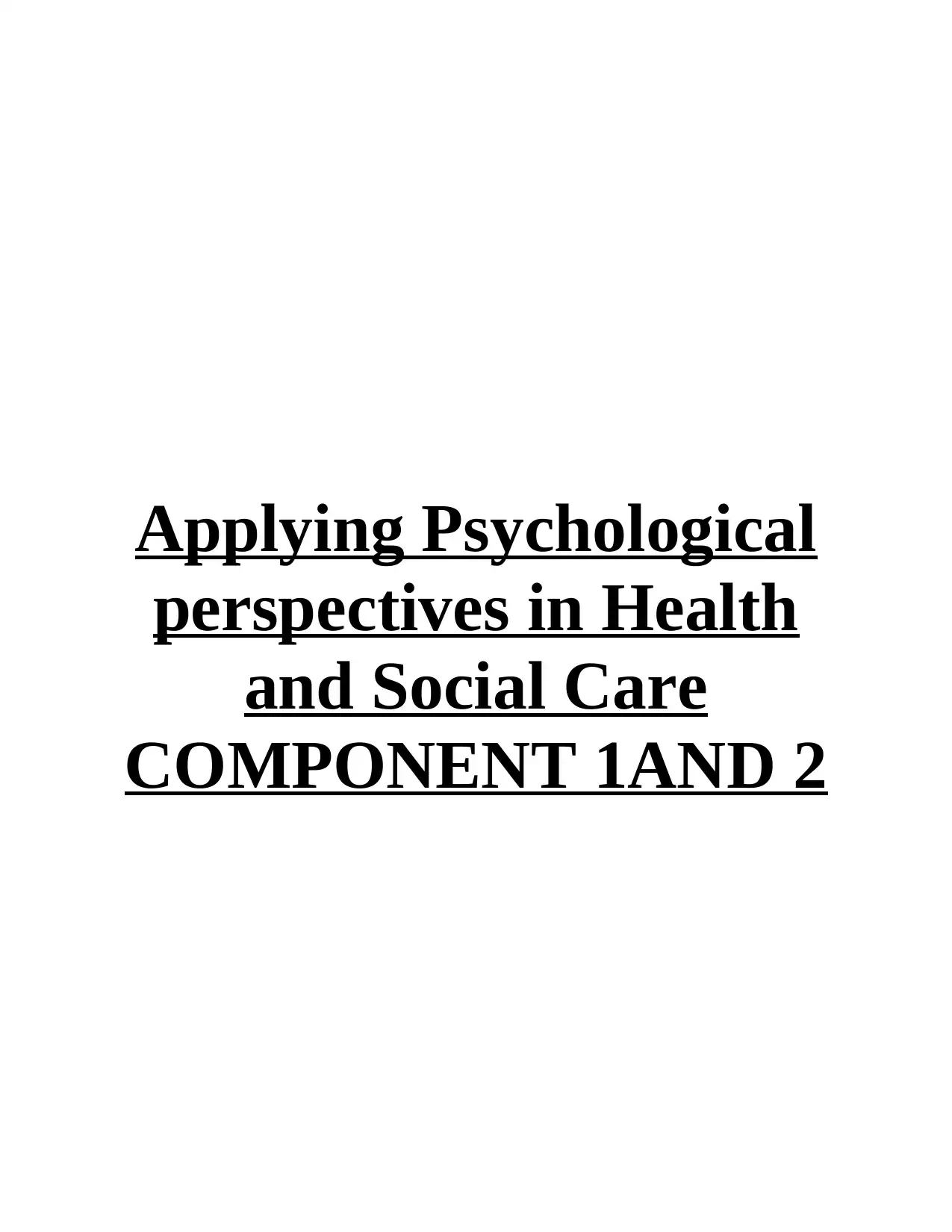
Applying Psychological
perspectives in Health
and Social Care
COMPONENT 1AND 2
perspectives in Health
and Social Care
COMPONENT 1AND 2
Paraphrase This Document
Need a fresh take? Get an instant paraphrase of this document with our AI Paraphraser
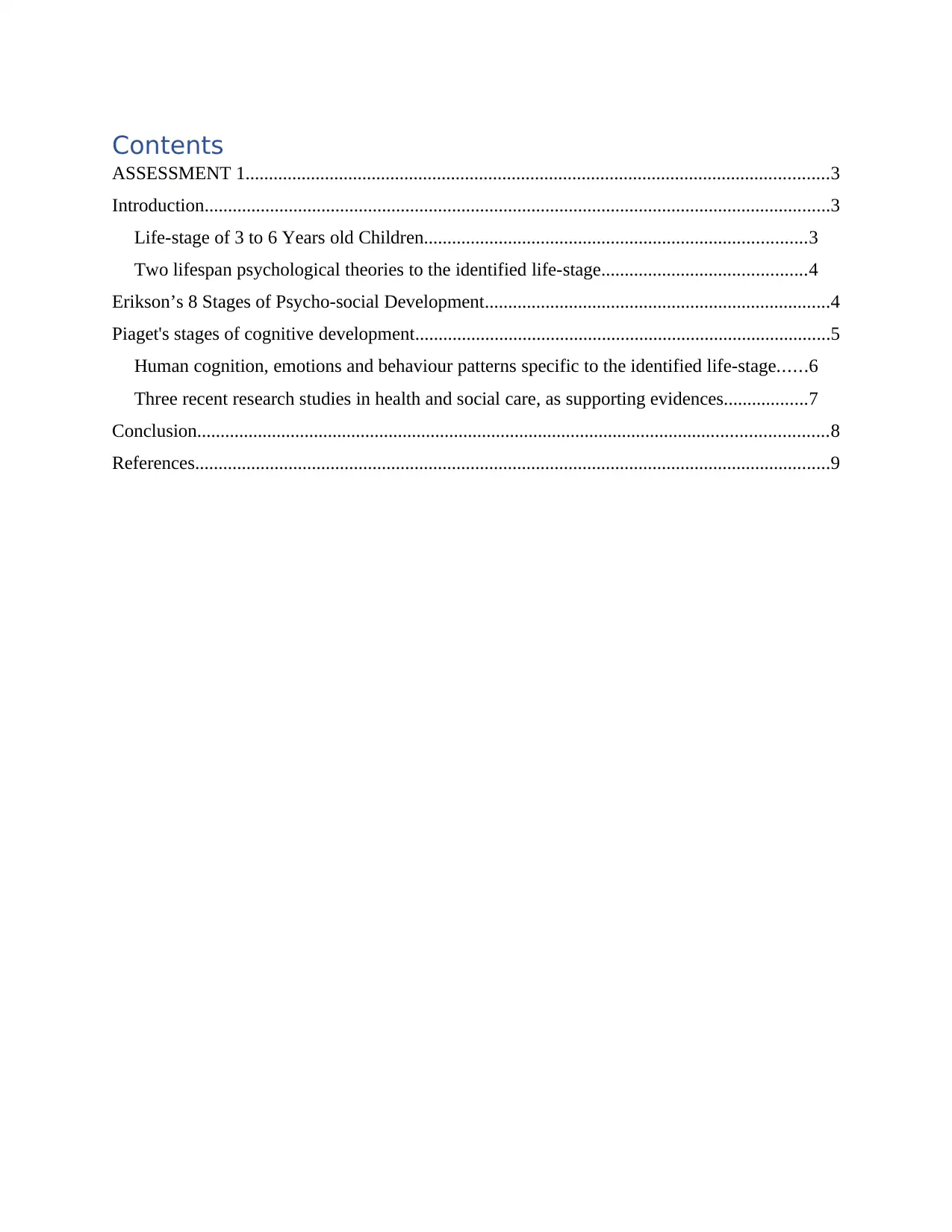
Contents
ASSESSMENT 1.............................................................................................................................3
Introduction......................................................................................................................................3
Life-stage of 3 to 6 Years old Children..................................................................................3
Two lifespan psychological theories to the identified life-stage............................................4
Erikson’s 8 Stages of Psycho-social Development..........................................................................4
Piaget's stages of cognitive development.........................................................................................5
Human cognition, emotions and behaviour patterns specific to the identified life-stage......6
Three recent research studies in health and social care, as supporting evidences..................7
Conclusion.......................................................................................................................................8
References........................................................................................................................................9
ASSESSMENT 1.............................................................................................................................3
Introduction......................................................................................................................................3
Life-stage of 3 to 6 Years old Children..................................................................................3
Two lifespan psychological theories to the identified life-stage............................................4
Erikson’s 8 Stages of Psycho-social Development..........................................................................4
Piaget's stages of cognitive development.........................................................................................5
Human cognition, emotions and behaviour patterns specific to the identified life-stage......6
Three recent research studies in health and social care, as supporting evidences..................7
Conclusion.......................................................................................................................................8
References........................................................................................................................................9
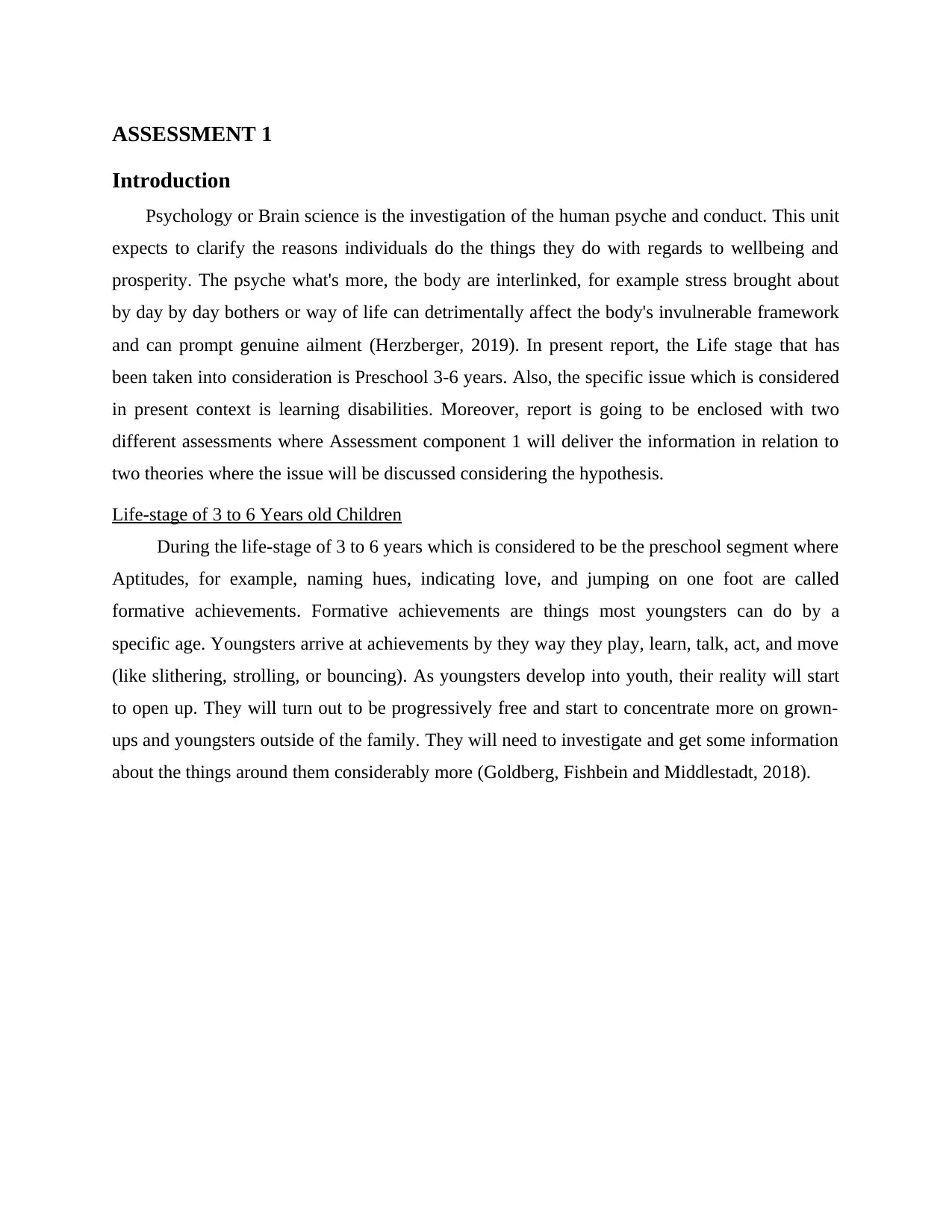
ASSESSMENT 1
Introduction
Psychology or Brain science is the investigation of the human psyche and conduct. This unit
expects to clarify the reasons individuals do the things they do with regards to wellbeing and
prosperity. The psyche what's more, the body are interlinked, for example stress brought about
by day by day bothers or way of life can detrimentally affect the body's invulnerable framework
and can prompt genuine ailment (Herzberger, 2019). In present report, the Life stage that has
been taken into consideration is Preschool 3-6 years. Also, the specific issue which is considered
in present context is learning disabilities. Moreover, report is going to be enclosed with two
different assessments where Assessment component 1 will deliver the information in relation to
two theories where the issue will be discussed considering the hypothesis.
Life-stage of 3 to 6 Years old Children
During the life-stage of 3 to 6 years which is considered to be the preschool segment where
Aptitudes, for example, naming hues, indicating love, and jumping on one foot are called
formative achievements. Formative achievements are things most youngsters can do by a
specific age. Youngsters arrive at achievements by they way they play, learn, talk, act, and move
(like slithering, strolling, or bouncing). As youngsters develop into youth, their reality will start
to open up. They will turn out to be progressively free and start to concentrate more on grown-
ups and youngsters outside of the family. They will need to investigate and get some information
about the things around them considerably more (Goldberg, Fishbein and Middlestadt, 2018).
Introduction
Psychology or Brain science is the investigation of the human psyche and conduct. This unit
expects to clarify the reasons individuals do the things they do with regards to wellbeing and
prosperity. The psyche what's more, the body are interlinked, for example stress brought about
by day by day bothers or way of life can detrimentally affect the body's invulnerable framework
and can prompt genuine ailment (Herzberger, 2019). In present report, the Life stage that has
been taken into consideration is Preschool 3-6 years. Also, the specific issue which is considered
in present context is learning disabilities. Moreover, report is going to be enclosed with two
different assessments where Assessment component 1 will deliver the information in relation to
two theories where the issue will be discussed considering the hypothesis.
Life-stage of 3 to 6 Years old Children
During the life-stage of 3 to 6 years which is considered to be the preschool segment where
Aptitudes, for example, naming hues, indicating love, and jumping on one foot are called
formative achievements. Formative achievements are things most youngsters can do by a
specific age. Youngsters arrive at achievements by they way they play, learn, talk, act, and move
(like slithering, strolling, or bouncing). As youngsters develop into youth, their reality will start
to open up. They will turn out to be progressively free and start to concentrate more on grown-
ups and youngsters outside of the family. They will need to investigate and get some information
about the things around them considerably more (Goldberg, Fishbein and Middlestadt, 2018).
⊘ This is a preview!⊘
Do you want full access?
Subscribe today to unlock all pages.

Trusted by 1+ million students worldwide
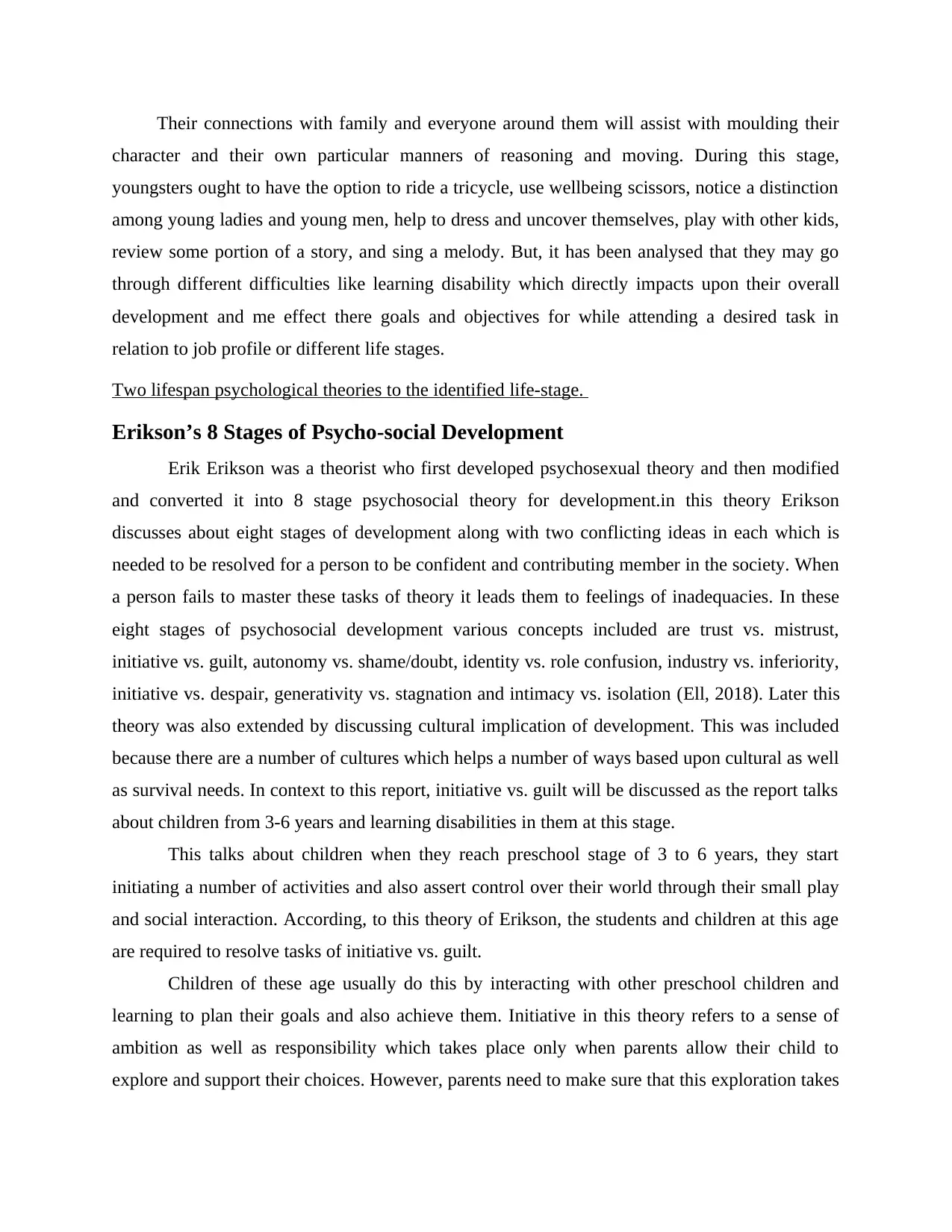
Their connections with family and everyone around them will assist with moulding their
character and their own particular manners of reasoning and moving. During this stage,
youngsters ought to have the option to ride a tricycle, use wellbeing scissors, notice a distinction
among young ladies and young men, help to dress and uncover themselves, play with other kids,
review some portion of a story, and sing a melody. But, it has been analysed that they may go
through different difficulties like learning disability which directly impacts upon their overall
development and me effect there goals and objectives for while attending a desired task in
relation to job profile or different life stages.
Two lifespan psychological theories to the identified life-stage.
Erikson’s 8 Stages of Psycho-social Development
Erik Erikson was a theorist who first developed psychosexual theory and then modified
and converted it into 8 stage psychosocial theory for development.in this theory Erikson
discusses about eight stages of development along with two conflicting ideas in each which is
needed to be resolved for a person to be confident and contributing member in the society. When
a person fails to master these tasks of theory it leads them to feelings of inadequacies. In these
eight stages of psychosocial development various concepts included are trust vs. mistrust,
initiative vs. guilt, autonomy vs. shame/doubt, identity vs. role confusion, industry vs. inferiority,
initiative vs. despair, generativity vs. stagnation and intimacy vs. isolation (Ell, 2018). Later this
theory was also extended by discussing cultural implication of development. This was included
because there are a number of cultures which helps a number of ways based upon cultural as well
as survival needs. In context to this report, initiative vs. guilt will be discussed as the report talks
about children from 3-6 years and learning disabilities in them at this stage.
This talks about children when they reach preschool stage of 3 to 6 years, they start
initiating a number of activities and also assert control over their world through their small play
and social interaction. According, to this theory of Erikson, the students and children at this age
are required to resolve tasks of initiative vs. guilt.
Children of these age usually do this by interacting with other preschool children and
learning to plan their goals and also achieve them. Initiative in this theory refers to a sense of
ambition as well as responsibility which takes place only when parents allow their child to
explore and support their choices. However, parents need to make sure that this exploration takes
character and their own particular manners of reasoning and moving. During this stage,
youngsters ought to have the option to ride a tricycle, use wellbeing scissors, notice a distinction
among young ladies and young men, help to dress and uncover themselves, play with other kids,
review some portion of a story, and sing a melody. But, it has been analysed that they may go
through different difficulties like learning disability which directly impacts upon their overall
development and me effect there goals and objectives for while attending a desired task in
relation to job profile or different life stages.
Two lifespan psychological theories to the identified life-stage.
Erikson’s 8 Stages of Psycho-social Development
Erik Erikson was a theorist who first developed psychosexual theory and then modified
and converted it into 8 stage psychosocial theory for development.in this theory Erikson
discusses about eight stages of development along with two conflicting ideas in each which is
needed to be resolved for a person to be confident and contributing member in the society. When
a person fails to master these tasks of theory it leads them to feelings of inadequacies. In these
eight stages of psychosocial development various concepts included are trust vs. mistrust,
initiative vs. guilt, autonomy vs. shame/doubt, identity vs. role confusion, industry vs. inferiority,
initiative vs. despair, generativity vs. stagnation and intimacy vs. isolation (Ell, 2018). Later this
theory was also extended by discussing cultural implication of development. This was included
because there are a number of cultures which helps a number of ways based upon cultural as well
as survival needs. In context to this report, initiative vs. guilt will be discussed as the report talks
about children from 3-6 years and learning disabilities in them at this stage.
This talks about children when they reach preschool stage of 3 to 6 years, they start
initiating a number of activities and also assert control over their world through their small play
and social interaction. According, to this theory of Erikson, the students and children at this age
are required to resolve tasks of initiative vs. guilt.
Children of these age usually do this by interacting with other preschool children and
learning to plan their goals and also achieve them. Initiative in this theory refers to a sense of
ambition as well as responsibility which takes place only when parents allow their child to
explore and support their choices. However, parents need to make sure that this exploration takes
Paraphrase This Document
Need a fresh take? Get an instant paraphrase of this document with our AI Paraphraser
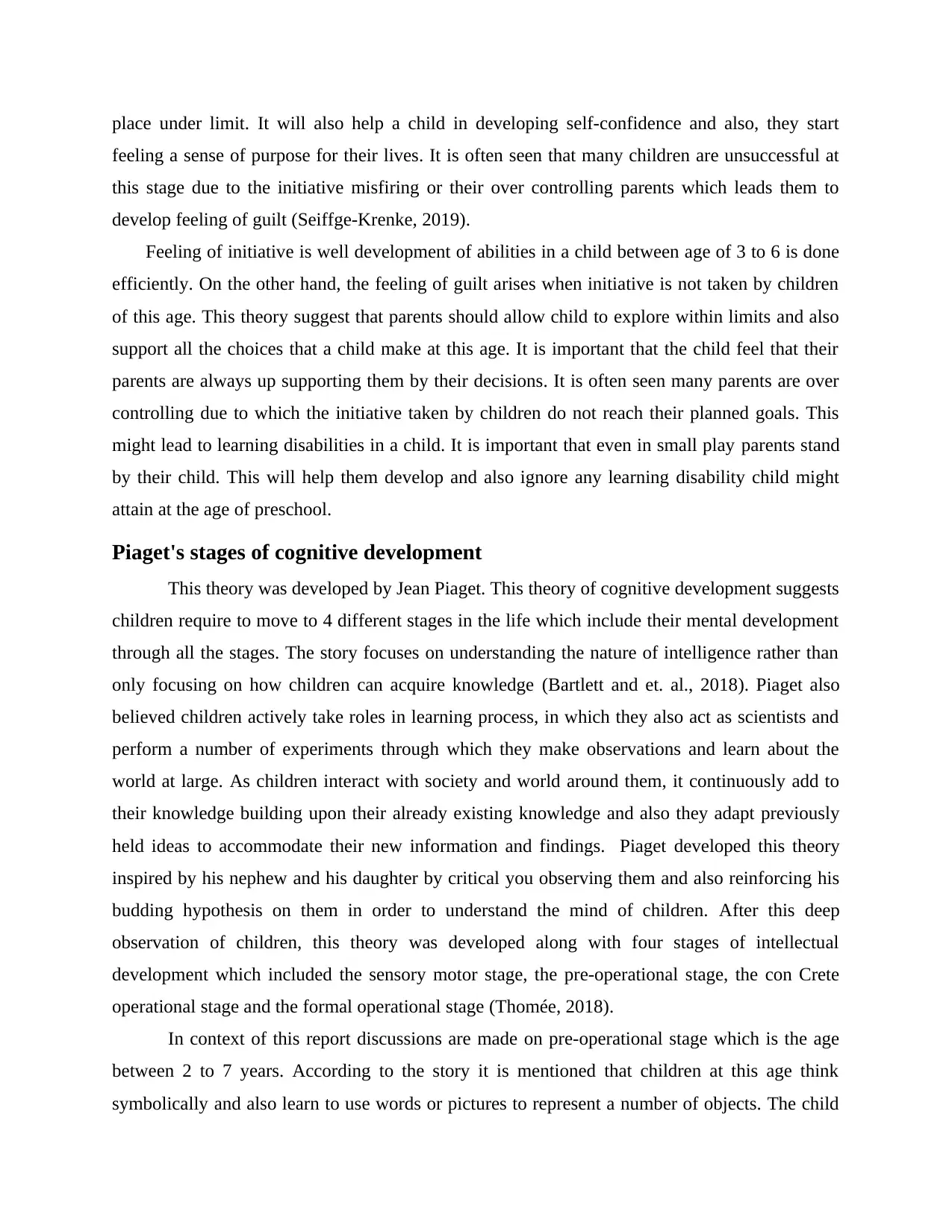
place under limit. It will also help a child in developing self-confidence and also, they start
feeling a sense of purpose for their lives. It is often seen that many children are unsuccessful at
this stage due to the initiative misfiring or their over controlling parents which leads them to
develop feeling of guilt (Seiffge-Krenke, 2019).
Feeling of initiative is well development of abilities in a child between age of 3 to 6 is done
efficiently. On the other hand, the feeling of guilt arises when initiative is not taken by children
of this age. This theory suggest that parents should allow child to explore within limits and also
support all the choices that a child make at this age. It is important that the child feel that their
parents are always up supporting them by their decisions. It is often seen many parents are over
controlling due to which the initiative taken by children do not reach their planned goals. This
might lead to learning disabilities in a child. It is important that even in small play parents stand
by their child. This will help them develop and also ignore any learning disability child might
attain at the age of preschool.
Piaget's stages of cognitive development
This theory was developed by Jean Piaget. This theory of cognitive development suggests
children require to move to 4 different stages in the life which include their mental development
through all the stages. The story focuses on understanding the nature of intelligence rather than
only focusing on how children can acquire knowledge (Bartlett and et. al., 2018). Piaget also
believed children actively take roles in learning process, in which they also act as scientists and
perform a number of experiments through which they make observations and learn about the
world at large. As children interact with society and world around them, it continuously add to
their knowledge building upon their already existing knowledge and also they adapt previously
held ideas to accommodate their new information and findings. Piaget developed this theory
inspired by his nephew and his daughter by critical you observing them and also reinforcing his
budding hypothesis on them in order to understand the mind of children. After this deep
observation of children, this theory was developed along with four stages of intellectual
development which included the sensory motor stage, the pre-operational stage, the con Crete
operational stage and the formal operational stage (Thomée, 2018).
In context of this report discussions are made on pre-operational stage which is the age
between 2 to 7 years. According to the story it is mentioned that children at this age think
symbolically and also learn to use words or pictures to represent a number of objects. The child
feeling a sense of purpose for their lives. It is often seen that many children are unsuccessful at
this stage due to the initiative misfiring or their over controlling parents which leads them to
develop feeling of guilt (Seiffge-Krenke, 2019).
Feeling of initiative is well development of abilities in a child between age of 3 to 6 is done
efficiently. On the other hand, the feeling of guilt arises when initiative is not taken by children
of this age. This theory suggest that parents should allow child to explore within limits and also
support all the choices that a child make at this age. It is important that the child feel that their
parents are always up supporting them by their decisions. It is often seen many parents are over
controlling due to which the initiative taken by children do not reach their planned goals. This
might lead to learning disabilities in a child. It is important that even in small play parents stand
by their child. This will help them develop and also ignore any learning disability child might
attain at the age of preschool.
Piaget's stages of cognitive development
This theory was developed by Jean Piaget. This theory of cognitive development suggests
children require to move to 4 different stages in the life which include their mental development
through all the stages. The story focuses on understanding the nature of intelligence rather than
only focusing on how children can acquire knowledge (Bartlett and et. al., 2018). Piaget also
believed children actively take roles in learning process, in which they also act as scientists and
perform a number of experiments through which they make observations and learn about the
world at large. As children interact with society and world around them, it continuously add to
their knowledge building upon their already existing knowledge and also they adapt previously
held ideas to accommodate their new information and findings. Piaget developed this theory
inspired by his nephew and his daughter by critical you observing them and also reinforcing his
budding hypothesis on them in order to understand the mind of children. After this deep
observation of children, this theory was developed along with four stages of intellectual
development which included the sensory motor stage, the pre-operational stage, the con Crete
operational stage and the formal operational stage (Thomée, 2018).
In context of this report discussions are made on pre-operational stage which is the age
between 2 to 7 years. According to the story it is mentioned that children at this age think
symbolically and also learn to use words or pictures to represent a number of objects. The child
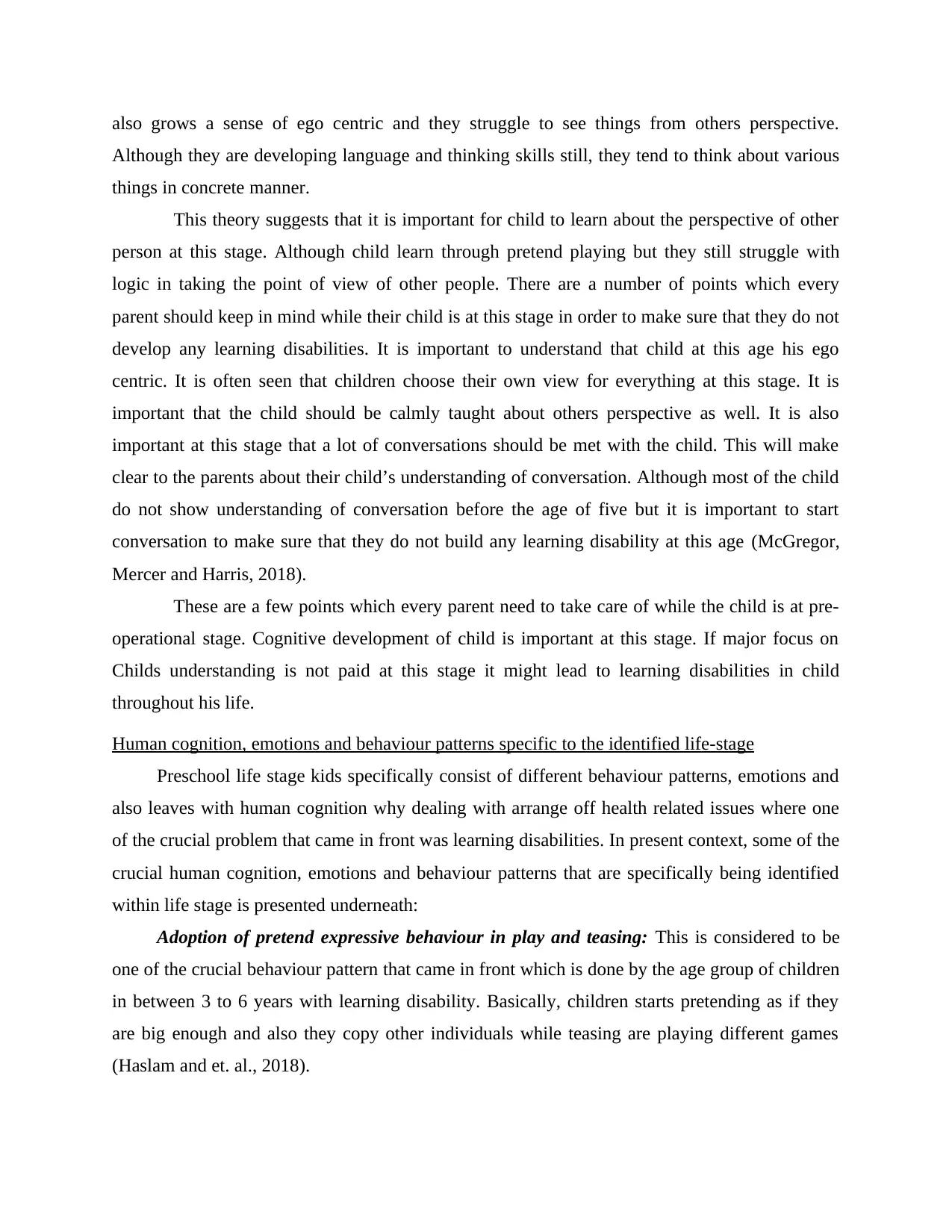
also grows a sense of ego centric and they struggle to see things from others perspective.
Although they are developing language and thinking skills still, they tend to think about various
things in concrete manner.
This theory suggests that it is important for child to learn about the perspective of other
person at this stage. Although child learn through pretend playing but they still struggle with
logic in taking the point of view of other people. There are a number of points which every
parent should keep in mind while their child is at this stage in order to make sure that they do not
develop any learning disabilities. It is important to understand that child at this age his ego
centric. It is often seen that children choose their own view for everything at this stage. It is
important that the child should be calmly taught about others perspective as well. It is also
important at this stage that a lot of conversations should be met with the child. This will make
clear to the parents about their child’s understanding of conversation. Although most of the child
do not show understanding of conversation before the age of five but it is important to start
conversation to make sure that they do not build any learning disability at this age (McGregor,
Mercer and Harris, 2018).
These are a few points which every parent need to take care of while the child is at pre-
operational stage. Cognitive development of child is important at this stage. If major focus on
Childs understanding is not paid at this stage it might lead to learning disabilities in child
throughout his life.
Human cognition, emotions and behaviour patterns specific to the identified life-stage
Preschool life stage kids specifically consist of different behaviour patterns, emotions and
also leaves with human cognition why dealing with arrange off health related issues where one
of the crucial problem that came in front was learning disabilities. In present context, some of the
crucial human cognition, emotions and behaviour patterns that are specifically being identified
within life stage is presented underneath:
Adoption of pretend expressive behaviour in play and teasing: This is considered to be
one of the crucial behaviour pattern that came in front which is done by the age group of children
in between 3 to 6 years with learning disability. Basically, children starts pretending as if they
are big enough and also they copy other individuals while teasing are playing different games
(Haslam and et. al., 2018).
Although they are developing language and thinking skills still, they tend to think about various
things in concrete manner.
This theory suggests that it is important for child to learn about the perspective of other
person at this stage. Although child learn through pretend playing but they still struggle with
logic in taking the point of view of other people. There are a number of points which every
parent should keep in mind while their child is at this stage in order to make sure that they do not
develop any learning disabilities. It is important to understand that child at this age his ego
centric. It is often seen that children choose their own view for everything at this stage. It is
important that the child should be calmly taught about others perspective as well. It is also
important at this stage that a lot of conversations should be met with the child. This will make
clear to the parents about their child’s understanding of conversation. Although most of the child
do not show understanding of conversation before the age of five but it is important to start
conversation to make sure that they do not build any learning disability at this age (McGregor,
Mercer and Harris, 2018).
These are a few points which every parent need to take care of while the child is at pre-
operational stage. Cognitive development of child is important at this stage. If major focus on
Childs understanding is not paid at this stage it might lead to learning disabilities in child
throughout his life.
Human cognition, emotions and behaviour patterns specific to the identified life-stage
Preschool life stage kids specifically consist of different behaviour patterns, emotions and
also leaves with human cognition why dealing with arrange off health related issues where one
of the crucial problem that came in front was learning disabilities. In present context, some of the
crucial human cognition, emotions and behaviour patterns that are specifically being identified
within life stage is presented underneath:
Adoption of pretend expressive behaviour in play and teasing: This is considered to be
one of the crucial behaviour pattern that came in front which is done by the age group of children
in between 3 to 6 years with learning disability. Basically, children starts pretending as if they
are big enough and also they copy other individuals while teasing are playing different games
(Haslam and et. al., 2018).
⊘ This is a preview!⊘
Do you want full access?
Subscribe today to unlock all pages.

Trusted by 1+ million students worldwide
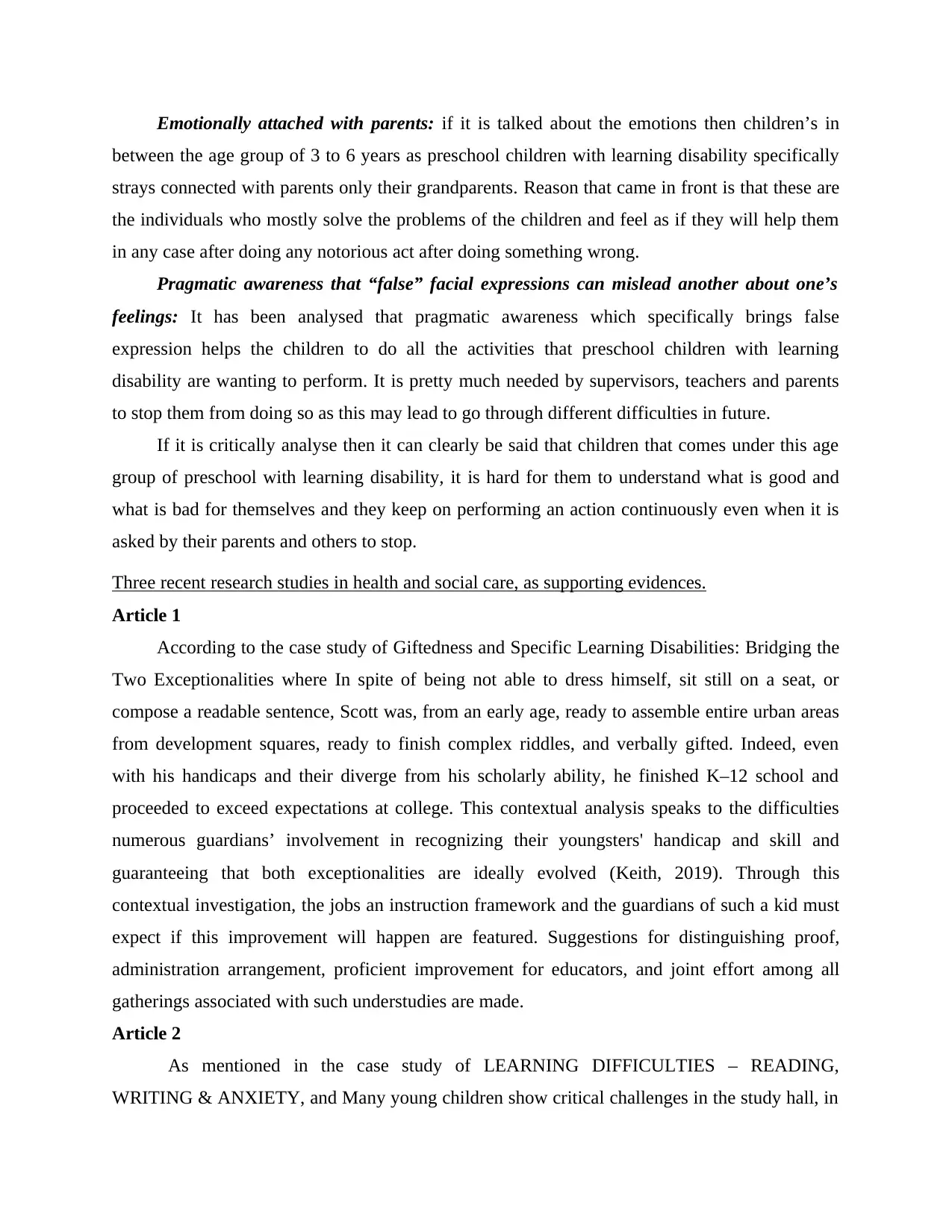
Emotionally attached with parents: if it is talked about the emotions then children’s in
between the age group of 3 to 6 years as preschool children with learning disability specifically
strays connected with parents only their grandparents. Reason that came in front is that these are
the individuals who mostly solve the problems of the children and feel as if they will help them
in any case after doing any notorious act after doing something wrong.
Pragmatic awareness that “false” facial expressions can mislead another about one’s
feelings: It has been analysed that pragmatic awareness which specifically brings false
expression helps the children to do all the activities that preschool children with learning
disability are wanting to perform. It is pretty much needed by supervisors, teachers and parents
to stop them from doing so as this may lead to go through different difficulties in future.
If it is critically analyse then it can clearly be said that children that comes under this age
group of preschool with learning disability, it is hard for them to understand what is good and
what is bad for themselves and they keep on performing an action continuously even when it is
asked by their parents and others to stop.
Three recent research studies in health and social care, as supporting evidences.
Article 1
According to the case study of Giftedness and Specific Learning Disabilities: Bridging the
Two Exceptionalities where In spite of being not able to dress himself, sit still on a seat, or
compose a readable sentence, Scott was, from an early age, ready to assemble entire urban areas
from development squares, ready to finish complex riddles, and verbally gifted. Indeed, even
with his handicaps and their diverge from his scholarly ability, he finished K–12 school and
proceeded to exceed expectations at college. This contextual analysis speaks to the difficulties
numerous guardians’ involvement in recognizing their youngsters' handicap and skill and
guaranteeing that both exceptionalities are ideally evolved (Keith, 2019). Through this
contextual investigation, the jobs an instruction framework and the guardians of such a kid must
expect if this improvement will happen are featured. Suggestions for distinguishing proof,
administration arrangement, proficient improvement for educators, and joint effort among all
gatherings associated with such understudies are made.
Article 2
As mentioned in the case study of LEARNING DIFFICULTIES – READING,
WRITING & ANXIETY, and Many young children show critical challenges in the study hall, in
between the age group of 3 to 6 years as preschool children with learning disability specifically
strays connected with parents only their grandparents. Reason that came in front is that these are
the individuals who mostly solve the problems of the children and feel as if they will help them
in any case after doing any notorious act after doing something wrong.
Pragmatic awareness that “false” facial expressions can mislead another about one’s
feelings: It has been analysed that pragmatic awareness which specifically brings false
expression helps the children to do all the activities that preschool children with learning
disability are wanting to perform. It is pretty much needed by supervisors, teachers and parents
to stop them from doing so as this may lead to go through different difficulties in future.
If it is critically analyse then it can clearly be said that children that comes under this age
group of preschool with learning disability, it is hard for them to understand what is good and
what is bad for themselves and they keep on performing an action continuously even when it is
asked by their parents and others to stop.
Three recent research studies in health and social care, as supporting evidences.
Article 1
According to the case study of Giftedness and Specific Learning Disabilities: Bridging the
Two Exceptionalities where In spite of being not able to dress himself, sit still on a seat, or
compose a readable sentence, Scott was, from an early age, ready to assemble entire urban areas
from development squares, ready to finish complex riddles, and verbally gifted. Indeed, even
with his handicaps and their diverge from his scholarly ability, he finished K–12 school and
proceeded to exceed expectations at college. This contextual analysis speaks to the difficulties
numerous guardians’ involvement in recognizing their youngsters' handicap and skill and
guaranteeing that both exceptionalities are ideally evolved (Keith, 2019). Through this
contextual investigation, the jobs an instruction framework and the guardians of such a kid must
expect if this improvement will happen are featured. Suggestions for distinguishing proof,
administration arrangement, proficient improvement for educators, and joint effort among all
gatherings associated with such understudies are made.
Article 2
As mentioned in the case study of LEARNING DIFFICULTIES – READING,
WRITING & ANXIETY, and Many young children show critical challenges in the study hall, in
Paraphrase This Document
Need a fresh take? Get an instant paraphrase of this document with our AI Paraphraser
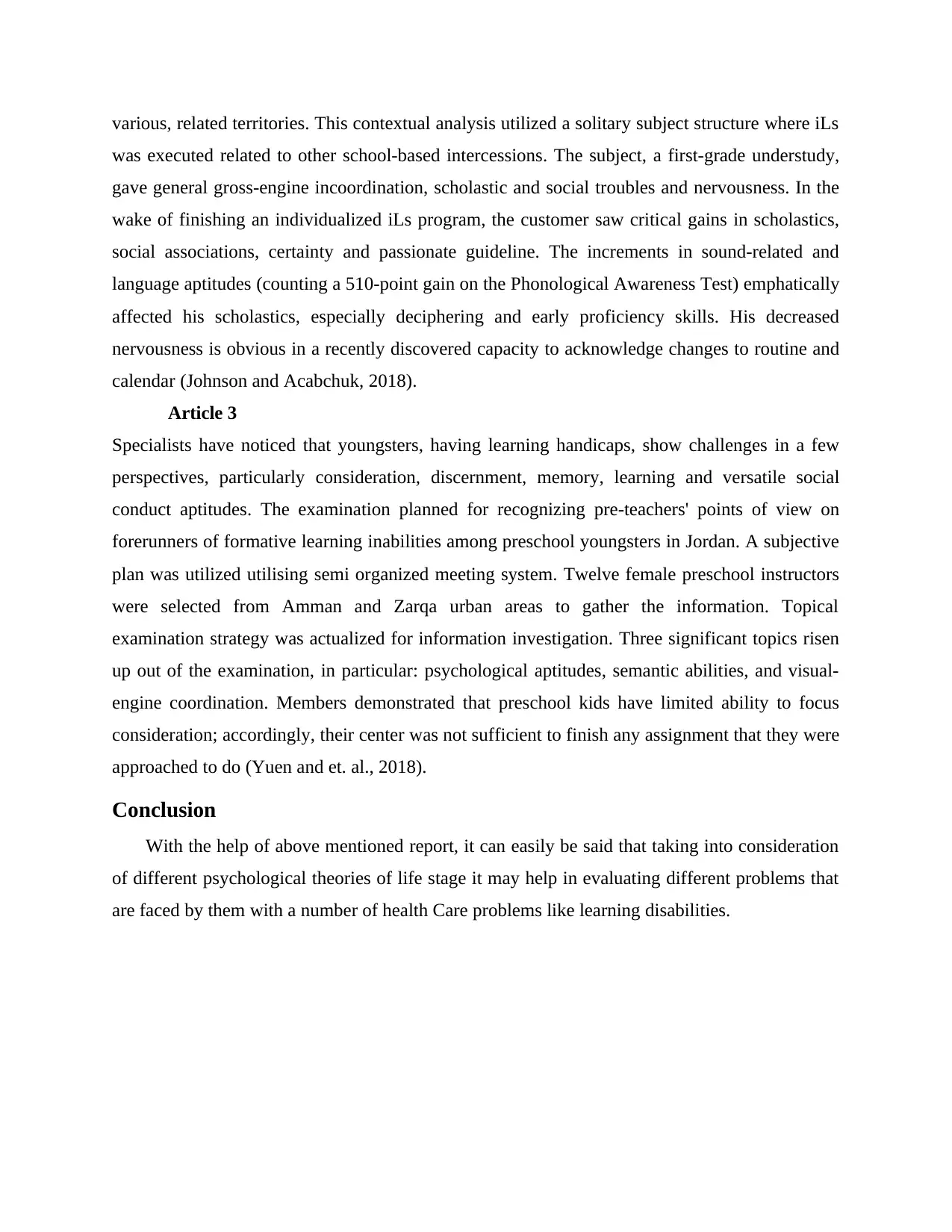
various, related territories. This contextual analysis utilized a solitary subject structure where iLs
was executed related to other school-based intercessions. The subject, a first-grade understudy,
gave general gross-engine incoordination, scholastic and social troubles and nervousness. In the
wake of finishing an individualized iLs program, the customer saw critical gains in scholastics,
social associations, certainty and passionate guideline. The increments in sound-related and
language aptitudes (counting a 510-point gain on the Phonological Awareness Test) emphatically
affected his scholastics, especially deciphering and early proficiency skills. His decreased
nervousness is obvious in a recently discovered capacity to acknowledge changes to routine and
calendar (Johnson and Acabchuk, 2018).
Article 3
Specialists have noticed that youngsters, having learning handicaps, show challenges in a few
perspectives, particularly consideration, discernment, memory, learning and versatile social
conduct aptitudes. The examination planned for recognizing pre-teachers' points of view on
forerunners of formative learning inabilities among preschool youngsters in Jordan. A subjective
plan was utilized utilising semi organized meeting system. Twelve female preschool instructors
were selected from Amman and Zarqa urban areas to gather the information. Topical
examination strategy was actualized for information investigation. Three significant topics risen
up out of the examination, in particular: psychological aptitudes, semantic abilities, and visual-
engine coordination. Members demonstrated that preschool kids have limited ability to focus
consideration; accordingly, their center was not sufficient to finish any assignment that they were
approached to do (Yuen and et. al., 2018).
Conclusion
With the help of above mentioned report, it can easily be said that taking into consideration
of different psychological theories of life stage it may help in evaluating different problems that
are faced by them with a number of health Care problems like learning disabilities.
was executed related to other school-based intercessions. The subject, a first-grade understudy,
gave general gross-engine incoordination, scholastic and social troubles and nervousness. In the
wake of finishing an individualized iLs program, the customer saw critical gains in scholastics,
social associations, certainty and passionate guideline. The increments in sound-related and
language aptitudes (counting a 510-point gain on the Phonological Awareness Test) emphatically
affected his scholastics, especially deciphering and early proficiency skills. His decreased
nervousness is obvious in a recently discovered capacity to acknowledge changes to routine and
calendar (Johnson and Acabchuk, 2018).
Article 3
Specialists have noticed that youngsters, having learning handicaps, show challenges in a few
perspectives, particularly consideration, discernment, memory, learning and versatile social
conduct aptitudes. The examination planned for recognizing pre-teachers' points of view on
forerunners of formative learning inabilities among preschool youngsters in Jordan. A subjective
plan was utilized utilising semi organized meeting system. Twelve female preschool instructors
were selected from Amman and Zarqa urban areas to gather the information. Topical
examination strategy was actualized for information investigation. Three significant topics risen
up out of the examination, in particular: psychological aptitudes, semantic abilities, and visual-
engine coordination. Members demonstrated that preschool kids have limited ability to focus
consideration; accordingly, their center was not sufficient to finish any assignment that they were
approached to do (Yuen and et. al., 2018).
Conclusion
With the help of above mentioned report, it can easily be said that taking into consideration
of different psychological theories of life stage it may help in evaluating different problems that
are faced by them with a number of health Care problems like learning disabilities.

⊘ This is a preview!⊘
Do you want full access?
Subscribe today to unlock all pages.

Trusted by 1+ million students worldwide
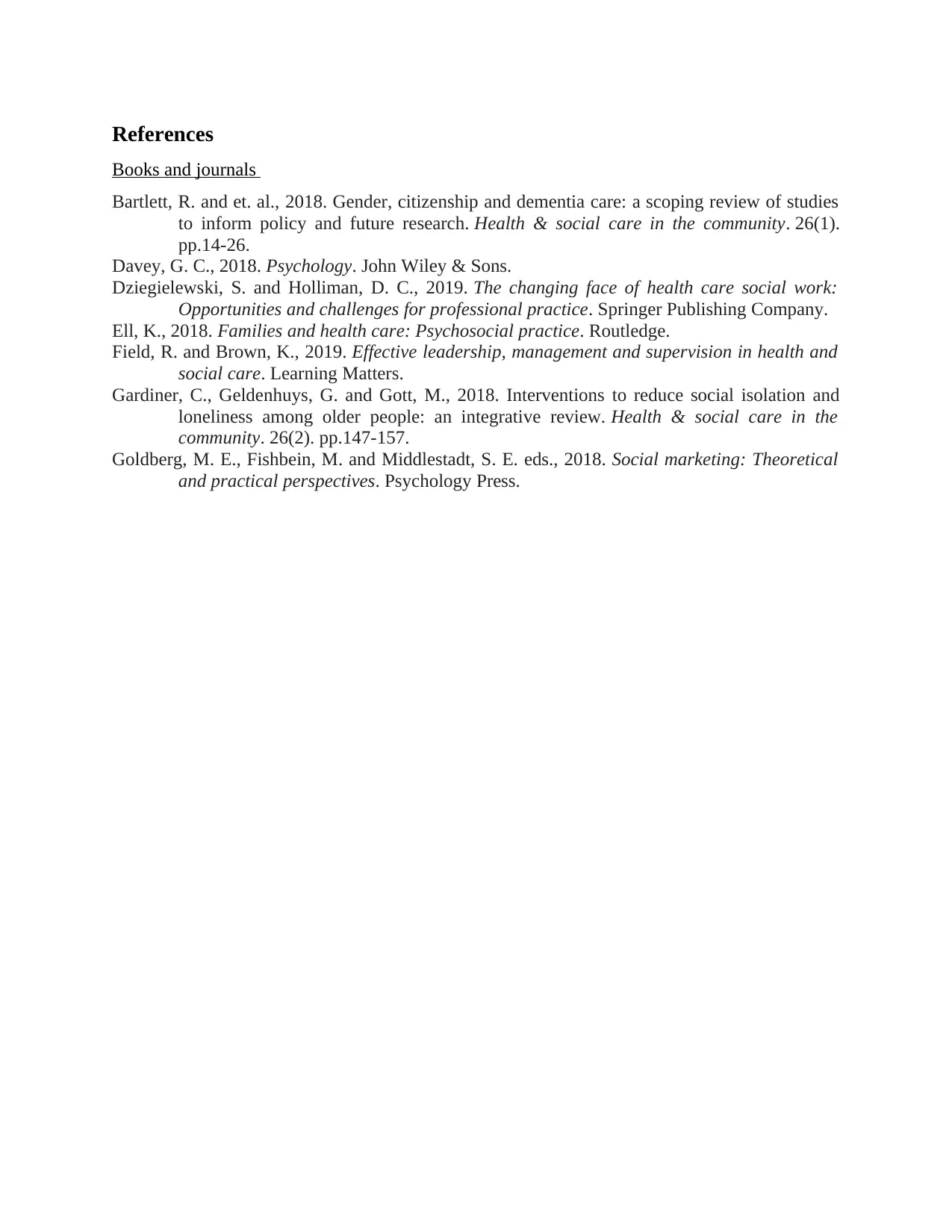
References
Books and journals
Bartlett, R. and et. al., 2018. Gender, citizenship and dementia care: a scoping review of studies
to inform policy and future research. Health & social care in the community. 26(1).
pp.14-26.
Davey, G. C., 2018. Psychology. John Wiley & Sons.
Dziegielewski, S. and Holliman, D. C., 2019. The changing face of health care social work:
Opportunities and challenges for professional practice. Springer Publishing Company.
Ell, K., 2018. Families and health care: Psychosocial practice. Routledge.
Field, R. and Brown, K., 2019. Effective leadership, management and supervision in health and
social care. Learning Matters.
Gardiner, C., Geldenhuys, G. and Gott, M., 2018. Interventions to reduce social isolation and
loneliness among older people: an integrative review. Health & social care in the
community. 26(2). pp.147-157.
Goldberg, M. E., Fishbein, M. and Middlestadt, S. E. eds., 2018. Social marketing: Theoretical
and practical perspectives. Psychology Press.
Books and journals
Bartlett, R. and et. al., 2018. Gender, citizenship and dementia care: a scoping review of studies
to inform policy and future research. Health & social care in the community. 26(1).
pp.14-26.
Davey, G. C., 2018. Psychology. John Wiley & Sons.
Dziegielewski, S. and Holliman, D. C., 2019. The changing face of health care social work:
Opportunities and challenges for professional practice. Springer Publishing Company.
Ell, K., 2018. Families and health care: Psychosocial practice. Routledge.
Field, R. and Brown, K., 2019. Effective leadership, management and supervision in health and
social care. Learning Matters.
Gardiner, C., Geldenhuys, G. and Gott, M., 2018. Interventions to reduce social isolation and
loneliness among older people: an integrative review. Health & social care in the
community. 26(2). pp.147-157.
Goldberg, M. E., Fishbein, M. and Middlestadt, S. E. eds., 2018. Social marketing: Theoretical
and practical perspectives. Psychology Press.
1 out of 10
Related Documents
Your All-in-One AI-Powered Toolkit for Academic Success.
+13062052269
info@desklib.com
Available 24*7 on WhatsApp / Email
![[object Object]](/_next/static/media/star-bottom.7253800d.svg)
Unlock your academic potential
Copyright © 2020–2026 A2Z Services. All Rights Reserved. Developed and managed by ZUCOL.





